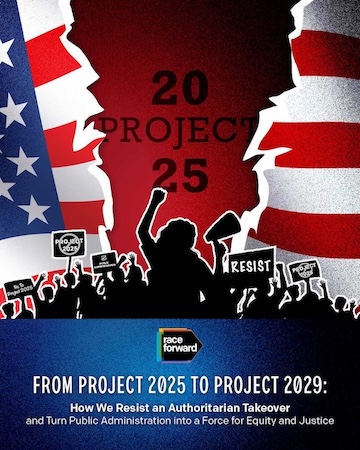
FROM PROJECT 2025 TO PROJECT 2029: How We Resist an Authoritarian Takeover and Turn Public Administration into a Force for Equity and Justice
This toolkit offers a road map to respond to the threat posed by Project 2025 to equitable, democratic and accountable public institutions, particularly our federal agencies, as well as longer-term strategies for turning public administration into a force for equity and justice.
Read More
This toolkit offers a road map to respond to the threat posed by Project 2025 to equitable, democratic and accountable public institutions, particularly our federal agencies, as well as longer-term strategies for turning public administration into a force for equity and justice.
Governing For Racial Equity

Co-Governance Tool for a Multiracial Democracy
Offering guidance and resources to support leaders in government and communities.
Read More
Offering guidance and resources to support leaders in government and communities.
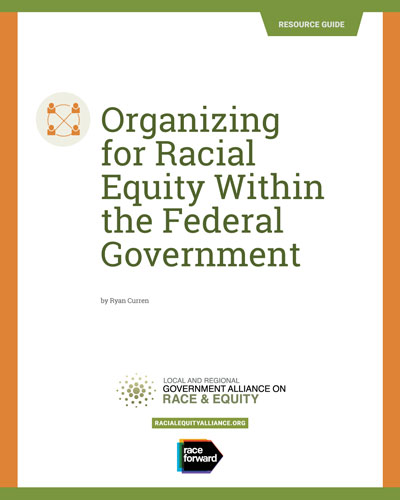
Organizing for Racial Equity Within the Federal Government
This guide provides multiple actions civil servants can take to strengthen and grow the influence of our public institutions so they serve their highest purpose.
Read More
This guide provides multiple actions civil servants can take to strengthen and grow the influence of our public institutions so they serve their highest purpose.
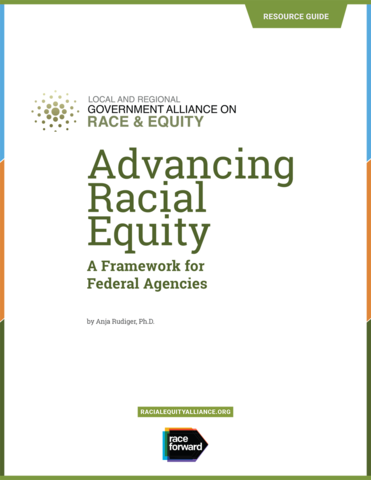
Advancing Racial Equity: A Framework for Federal Agencies
This guide describes the components of a racial equity approach and walks practitioners and leaders in the federal government through key actions in implementing racial equity strategies and the challenges they will face.
Read More
This guide describes the components of a racial equity approach and walks practitioners and leaders in the federal government through key actions in implementing racial equity strategies and the challenges they will face.
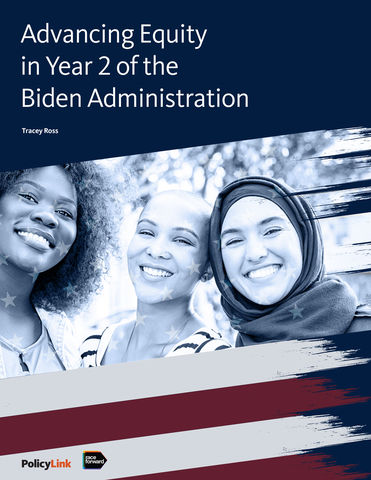
Advancing Equity in Year 2 of the Biden Administration
Created by Race Forward in partnership with PolicyLink, this guide helps federal civil servants build the knowledge, skills, and mindsets required for implementing racial equity policies throughout the federal government. Also included are a list of actions that should be taken by the federal government to begin meeting their stated goals in areas such as: Racial Equity in Federal Government; Gender and Sexual Orientation; Equitable Pandemic Response; and Immigration.
Read More
Created by Race Forward in partnership with PolicyLink, this guide helps federal civil servants build the knowledge, skills, and mindsets required for implementing racial equity policies throughout the federal government. Also included are a list of actions that should be taken by the federal government to begin meeting their stated goals in areas such as: Racial Equity in Federal Government; Gender and Sexual Orientation; Equitable Pandemic Response; and Immigration.
Grassroots Organizing
Some Organizational Resources in this Post-Election Moment
Organizers may find this resource compiled following the 2016 Election helpful as we enter a new election season. This resource guide provide activists, advocates and supporters of the racial justice movement with resources to help navigate the post-election landscape.
Note: neither the list of organizations nor groupings are exhaustive. In addition, the work of some of these largely national and under-the-radar groups cuts across the areas and other critical issues and communities. Please direct thoughts and questions to [email protected].
Read More
Organizers may find this resource compiled following the 2016 Election helpful as we enter a new election season. This resource guide provide activists, advocates and supporters of the racial justice movement with resources to help navigate the post-election landscape.
Note: neither the list of organizations nor groupings are exhaustive. In addition, the work of some of these largely national and under-the-radar groups cuts across the areas and other critical issues and communities. Please direct thoughts and questions to [email protected].

Compact for Racial Justice: An Agenda for Fairness and Unity
A collection of the bi-weekly series of conference calls hosted by the Applied Research Center, now Race Forward, that provides a proactive plan for fairness and unity in our communities, politics, the economy, and the law. The Compact offers concrete strategies and policy proposals to reverse racial disparities and move our society towards full equity, inclusion and dignity for all people.
Read More
A collection of the bi-weekly series of conference calls hosted by the Applied Research Center, now Race Forward, that provides a proactive plan for fairness and unity in our communities, politics, the economy, and the law. The Compact offers concrete strategies and policy proposals to reverse racial disparities and move our society towards full equity, inclusion and dignity for all people.
Model Policies
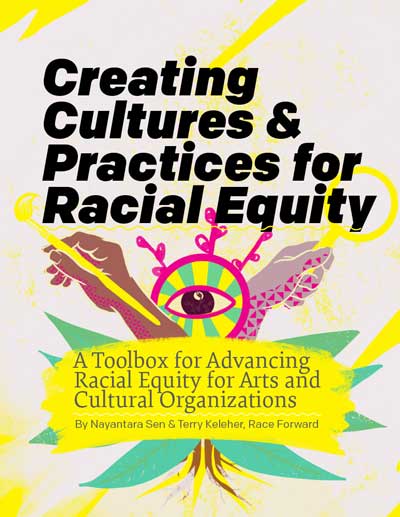
Creating Cultures and Practices for Racial Equity
Emerging from Race Forward’s Racial Equity in the Arts Innovation Lab, this set of tools help artists, arts advocates, culture bearers, and cultural workers imagine, plan, and implement racial equity strategies in arts organizations.
Whether you’re an arts or cultural practitioner already working with a racial equity team and plan or you’re just beginning the journey towards organizational transformation, these tools can be used to make strategic and equitable decisions in assessing existing or proposed policies, practices, plans, programs, grantmaking, contracting, budgets, and more.
Read More
Emerging from Race Forward’s Racial Equity in the Arts Innovation Lab, this set of tools help artists, arts advocates, culture bearers, and cultural workers imagine, plan, and implement racial equity strategies in arts organizations.
Whether you’re an arts or cultural practitioner already working with a racial equity team and plan or you’re just beginning the journey towards organizational transformation, these tools can be used to make strategic and equitable decisions in assessing existing or proposed policies, practices, plans, programs, grantmaking, contracting, budgets, and more.
Preventing Racial Inequity in Schools and Beyond
This brief video shows a success story of how community-based organizations worked with their school district to predict and prevent racial disparities in schools.
Read More
This brief video shows a success story of how community-based organizations worked with their school district to predict and prevent racial disparities in schools.
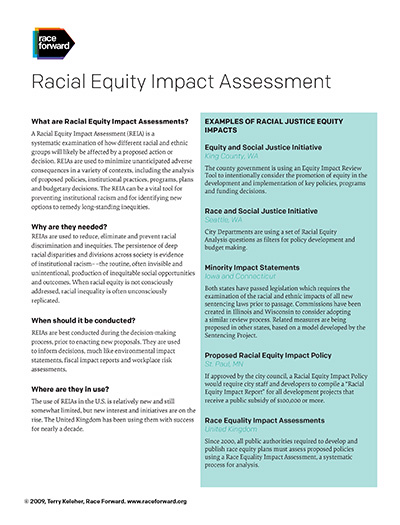
Racial Equity Impact Assessment Toolkit
A Racial Equity Impact Assessment (REI) is a vital tool for analyzing how different racial and ethnic groups will likely be affected by a proposed action or decision. Use of an REI, such as this one, minimizes unanticipated adverse consequences in a variety of contexts, including the analysis of proposed policies, institutional practices, programs, plans and budgetary decisions. It also provides the opportunity to prevent institutional racism and identify new options to remedy long-standing inequities.
Read More
A Racial Equity Impact Assessment (REI) is a vital tool for analyzing how different racial and ethnic groups will likely be affected by a proposed action or decision. Use of an REI, such as this one, minimizes unanticipated adverse consequences in a variety of contexts, including the analysis of proposed policies, institutional practices, programs, plans and budgetary decisions. It also provides the opportunity to prevent institutional racism and identify new options to remedy long-standing inequities.
Combating Racial Biases and Institutional/Structural Racism
This tool helps understand how biases play a role in systemic racism and provides debiasing strategies to mitigate, prevent, and eliminate biases.
Read More
This tool helps understand how biases play a role in systemic racism and provides debiasing strategies to mitigate, prevent, and eliminate biases.
Principles for Racially Equitable Policy Platforms
This set of five principles provides guidance for the development and implementation of racially equitable policy platforms. The principals are:
1. Fix systems, not people
2. Create racially equitable solutions that benefit all
3. Ensure that solutions are grounded in and emerge from the experience of communities of color, by engaging leaders of color who are accountable to those communities
4. Commit to collecting race/ethnicity data and use it to track and target the greatest needs
5. Set measurable, results-based equity goals with specific attention to racial impacts
Read More
This set of five principles provides guidance for the development and implementation of racially equitable policy platforms. The principals are:
1. Fix systems, not people
2. Create racially equitable solutions that benefit all
3. Ensure that solutions are grounded in and emerge from the experience of communities of color, by engaging leaders of color who are accountable to those communities
4. Commit to collecting race/ethnicity data and use it to track and target the greatest needs
5. Set measurable, results-based equity goals with specific attention to racial impacts
Narrative Strategy

Messages to Grow and Uproot: Narrative Strategy Amid Attacks on Diversity, Equity, Inclusion, and Racial Justice
"Narrative IS power. The stories and messages we repeat over time shape policies, outcomes, culture and material conditions." — Race Forward
Race Forward's new guide equips organizations with the tools to counter harmful narratives while strengthening messages that advance racial equity and justice. Don't let harmful narratives go unchallenged. Equip your organization with the tools to fight back and build the narrative power our movement needs.
Read More
"Narrative IS power. The stories and messages we repeat over time shape policies, outcomes, culture and material conditions." — Race Forward
Race Forward's new guide equips organizations with the tools to counter harmful narratives while strengthening messages that advance racial equity and justice. Don't let harmful narratives go unchallenged. Equip your organization with the tools to fight back and build the narrative power our movement needs.
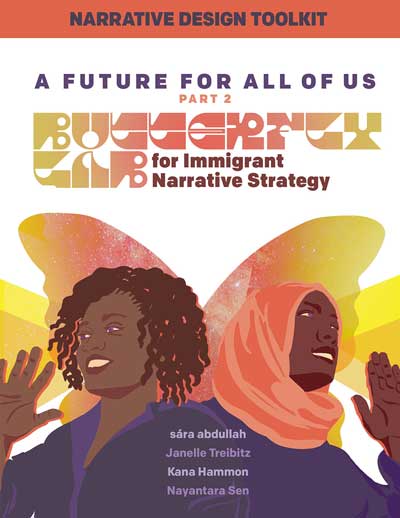
Butterfly Lab Narrative Design Toolkit
This step-by-step toolkit will help you get started in thinking about narrative, articulating your narrative strategy, and designing and implementing your narrative projects, whether a messaging campaign, video, art installation, street theatre, deep canvassing, direct action, or mass mobilization project.
Designed for for storytellers, dream weavers, community builders, and those looking to uplift pro social justice narratives, the tools within this toolkit will allow you to analyze the narrative terrain, sharpen your narratives, identify and reach your audience. While based on the immigration movement, these tools can be applied to many more topics or issues.
Read More
This step-by-step toolkit will help you get started in thinking about narrative, articulating your narrative strategy, and designing and implementing your narrative projects, whether a messaging campaign, video, art installation, street theatre, deep canvassing, direct action, or mass mobilization project.
Designed for for storytellers, dream weavers, community builders, and those looking to uplift pro social justice narratives, the tools within this toolkit will allow you to analyze the narrative terrain, sharpen your narratives, identify and reach your audience. While based on the immigration movement, these tools can be applied to many more topics or issues.
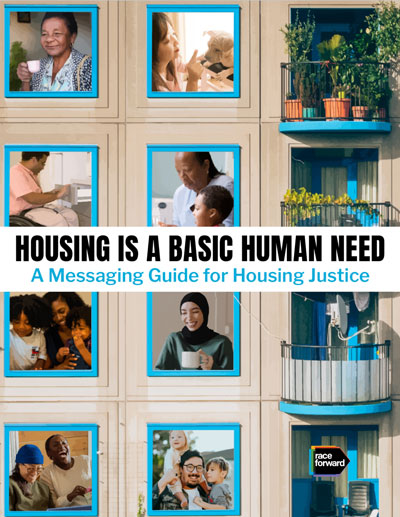
Housing Is A Basic Human Need Messaging Guide For Housing Justice
This resource helps renter and tenant organizers, homeowners, community leaders, housing policy advocates, and everyone who cares about housing as a basic human need talk about housing justice in a way that gets your neighbors excited, wins policy change, and shifts narratives to advance a vision of racial justice and homes for all.
Read More
This resource helps renter and tenant organizers, homeowners, community leaders, housing policy advocates, and everyone who cares about housing as a basic human need talk about housing justice in a way that gets your neighbors excited, wins policy change, and shifts narratives to advance a vision of racial justice and homes for all.
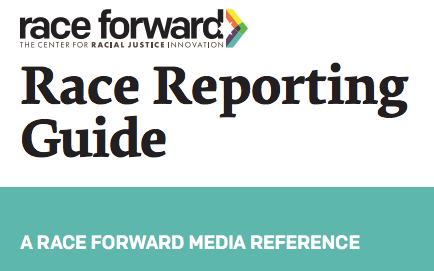
Race Reporting Guide
As demographics in this country continue to shift, it is more urgent than ever to speak openly about racial bias and inequity, and their deep roots in our history, culture and institutions, despite recent backlash to do so.
This guide provides critical support for the use of responsible language and story framing that reflects ethical and rigorous journalistic standards and affirms the dignity and human rights of people of all races. Although not comprehensive, the guide serves as a tool for journalists and thought leaders in the U.S. talking about race, racism, and racial justice in the media by providing context and guidelines to inform reporting and language.
Read More
As demographics in this country continue to shift, it is more urgent than ever to speak openly about racial bias and inequity, and their deep roots in our history, culture and institutions, despite recent backlash to do so.
This guide provides critical support for the use of responsible language and story framing that reflects ethical and rigorous journalistic standards and affirms the dignity and human rights of people of all races. Although not comprehensive, the guide serves as a tool for journalists and thought leaders in the U.S. talking about race, racism, and racial justice in the media by providing context and guidelines to inform reporting and language.
#BannedWords Campaign
This tool provides guidance to parents, activists, and government workers to counter-narrating the attacks on Critical Race Theory. Get help with crafting responses to the attacks seeking to undermine the momentum of racial justice movements.
Read More
This tool provides guidance to parents, activists, and government workers to counter-narrating the attacks on Critical Race Theory. Get help with crafting responses to the attacks seeking to undermine the momentum of racial justice movements.
Race and the Economy
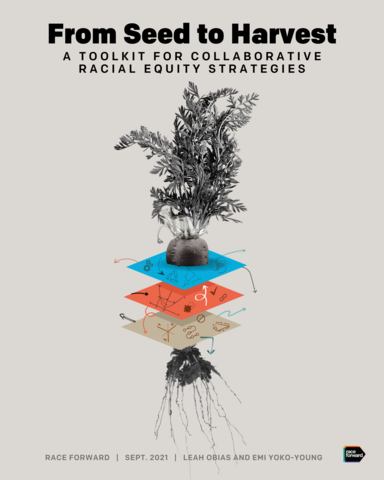
From Seed to Harvest: A Toolkit for Collaborative Racial Equity Strategies
This toolkit guides racial equity practices within community-government collaborations for sustainability and renewable energy policies and programs.
In addition to laying out a process for cultivating a plan, program, or policies through three steps: Preparation; Planting and Growth; and Harvest and Regrowth, the toolkit also highlights important questions to ask in a collaborative effort, and it’s a handy resource to keep in your racial equity shed for ready reference.
Read More
This toolkit guides racial equity practices within community-government collaborations for sustainability and renewable energy policies and programs.
In addition to laying out a process for cultivating a plan, program, or policies through three steps: Preparation; Planting and Growth; and Harvest and Regrowth, the toolkit also highlights important questions to ask in a collaborative effort, and it’s a handy resource to keep in your racial equity shed for ready reference.
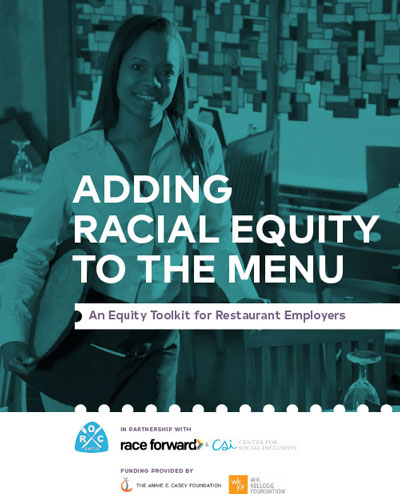
Adding Racial Equity to the Menu: An Equity Toolkit for Restaurant Employers
As the interest—and appetite—for equity increases, not only among customers, but also among restaurant owners, and of course, restaurant workers, this toolkit provides restaurant management with practical resources for assessing, planning, and implementing steps toward racial equity. From shifting towards sustainable, locally sourced, and organic food to making the fair treatment and compensation of employees a prominent part of their mission, operations, customer appeal, and overall brand, no step is too small. Every action can help a business thrive and fosters stronger local relationships with workers and consumers.
This toolkit can help you:
- Identify where racial biaes—whether conscious or unconscious—might be operating in the functions or policies of your restaurant, thus creating barriers to success for employees of color and your business as a whole
- Craft a plan to eliminate those barriers.
Read More
As the interest—and appetite—for equity increases, not only among customers, but also among restaurant owners, and of course, restaurant workers, this toolkit provides restaurant management with practical resources for assessing, planning, and implementing steps toward racial equity. From shifting towards sustainable, locally sourced, and organic food to making the fair treatment and compensation of employees a prominent part of their mission, operations, customer appeal, and overall brand, no step is too small. Every action can help a business thrive and fosters stronger local relationships with workers and consumers.
This toolkit can help you:
- Identify where racial biaes—whether conscious or unconscious—might be operating in the functions or policies of your restaurant, thus creating barriers to success for employees of color and your business as a whole
- Craft a plan to eliminate those barriers.
Racial Equity Impact Assessments for Economic Policies and Budgets
This assessment toolkit helps analyze and assess the actual or anticipated effects of public policies and budgets in order to identify ways to maximize equity and inclusion, and minimize adverse and unanticipated impacts on different racial and ethnic groups.
The toolkit includes:
- The Racial Equity Impact Assessment Guide for Economic Policies and Public Budgets: This guide includes a list of helpful questions to consider when conducting a racial impact assessment on existing or proposed economic policies or public budgets.
- Advocating for Racial Equity in Economic Policies and Public Budgets: Examples & Resources: This list provides research, recommendations, findings and frames by a dozen organizations engaged in the public debate around the federal economic recovery and stimulus policies, state budgets, and the subprime lending crisis. Many include links to action options.
Read More
This assessment toolkit helps analyze and assess the actual or anticipated effects of public policies and budgets in order to identify ways to maximize equity and inclusion, and minimize adverse and unanticipated impacts on different racial and ethnic groups.
The toolkit includes:
- The Racial Equity Impact Assessment Guide for Economic Policies and Public Budgets: This guide includes a list of helpful questions to consider when conducting a racial impact assessment on existing or proposed economic policies or public budgets.
- Advocating for Racial Equity in Economic Policies and Public Budgets: Examples & Resources: This list provides research, recommendations, findings and frames by a dozen organizations engaged in the public debate around the federal economic recovery and stimulus policies, state budgets, and the subprime lending crisis. Many include links to action options.
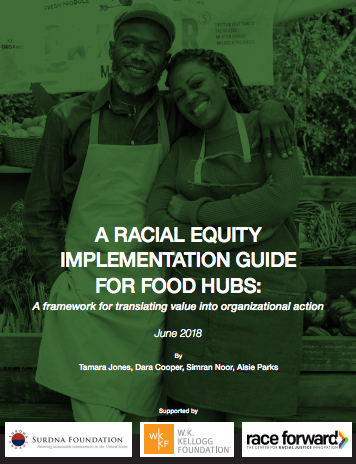
Racial Equity Implementation Guide for Food Hubs
A guide to fostering conversations that can help food hubs deepen their racial equity practices.
Read More
A guide to fostering conversations that can help food hubs deepen their racial equity practices.
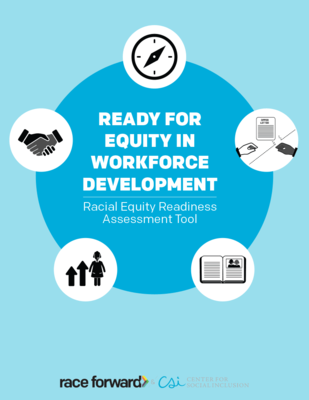
Racial Equity Readiness Assessment for Workforce Development
This guide for workforce development organizations and practitioners helps assess programs, operations, and culture in order to identify strength areas and growth opportunities. Practitioners can use this toolkit to familiarize themselves with various practices and policies that support institutional racial equity, evaluate their current efforts, and plan action steps.
Read More
This guide for workforce development organizations and practitioners helps assess programs, operations, and culture in order to identify strength areas and growth opportunities. Practitioners can use this toolkit to familiarize themselves with various practices and policies that support institutional racial equity, evaluate their current efforts, and plan action steps.
